Degrowth is a word I’ve been noticing increasingly often and when I start noticing I’m seeing something more and more often, I sometimes begin paying attention to it.
Hardcore capitalists dismiss it as yet another idiotic socialist idea although some have seen in degrowth a tool for the dismantling of modern society as we know it.
Hardcore socialists insist that we need a new system, in which GDP growth is not the basis for a nation’s well-being. Because it would be better for us and the planet.
As someone who prefers to stretch her ideological legs in the no man’s land between these two camps, I found the idea of degrowth fascinating and worth some research.
So I did some very superficial research. This paper, for instance, offers us a focus on satisfying needs, dismissing wants, and doing away with oil, gas, fast fashion, advertising and — gasp — private jets.
The arguments in the paper are put forward with endearing child-like sincerity and the apparently genuine belief that this would be possible, along with true ideological gems such as a guarantees for “green jobs” and shorter working hours.
Yet it makes a valid point about planned obsolescence, which is why I said I sit between capitalists and socialists. I doubt anyone outside electronics producer circles is a fan of planned obsolescence. I know I’m not. I greatly resent it, not least because I tend to develop emotional attachments to the things I use.
As a whole, however, the paper is a pile of ideological, star-eyed garbage. Except for the suggestion we use less of everything.
That suggestion was also expressed in this article by Gail Tverberg, who, I hear, is a well-known degrowth advocate. The approach in her article about the flaws of the energy transition is a lot subtler than that of the authors of the above paper and much more rational but it basically comes down to the same suggestion: we need to start using less of everything, which boils down to using less energy.
Then, the other day, Tammy Nemeth, podcast partner and a wealth of information and expertise, sent me this news report about an upcoming event dubbed the Beyond Growth Conference.
As a trailer, the conference will discuss replacing GDP with some other economic health indicator that would focus on reducing inequality instead of economic product growth. Perfect, I thought. Makes a lot of sense, as expressed by the UN Special Rapporteur on Extreme Poverty and Human Rights: “GDP growth means very little to people in poverty when they do not benefit from such general economic progress.”
No one would argue with that, but the question remains how exactly we do it. Because just switching from growth to poverty monitoring would do nothing, not to mention that GDP growth is not without any effect on poverty levels, to put it mildly. But the idea seems to be to teach people to start living within their means.
Somewhere around that point I’m afraid I got a bit bored. I don’t have any truck with excessive consumption, I thought. I hate waste. I do not change my wardrobe completely every year. Neither do the other members of my family. We eat out once a year. What more do you want me to do, I asked those lower consumption advocates I will hopefully never meet.
And then I had an idea. Let’s see my carbon footprint, I told myself. That’s the goal right? They’re just talking about poverty to make people like me care about their consumption as expressed in emissions. So, let’s make some calculations, I thought. And I did. Five of them.
#1 The UN calculator
This one was the first result in Google and it was the simplest one. Per the results, my biggest sin is the fact I eat meat. Compared to that, my car is small potatoes. The firewood we use is small potatoes. Good to know but unsatisfactory and nowhere near enough to send me on the intended guilt trip with that above-average number.
#2 The WWF calculator
This one had a more detailed questionnaire but there were again a lot of assumptions and questions I couldn’t answer because how would I know how many kilos of gas I use annually? It comes in bottles and a bottle lasts several months. Better results but still inconclusive.
#3 Conservation International calculator
This one was also detailed and it made me feel good about the fact I line dry my laundry (because no way in hell am I paying more for electricity with a dryer and also it smells a lot better) and the fact I don’t fly. But they lost me at the mpgs. I know my car does 6.4 litres per 100 km and I’m not wasting time converting this. They only had average fuel efficiency ranges anyway. Check out their indulgence offer, though. So charmingly Mediaeval.
#4 My Climate calculator
My Climate is, according to their website, “an international climate protection organisation”. Fine but their calculator made some really weird assumptions such as minimum monthly expenditure on new clothes and shoes of 60 euros. I don’t spend so much money but I had to check it because there was no lower option. Lazy job.
#5 Carbon Independent calculator
Carbon Independent is, apparently, a website by “a policy scientist” who happens to be a doctor. MD, that is. Okay. The questionnaire here had an option for specific energy consumption figures, which is great but I don’t know my exact figures so I approximated (that gas figure is an assumption based on house size). That doctor does not seem to hate meat as much as the UN, which was refreshing.
At this point I got bored again because the message was clear: consume less to be good. Or pay $23 per month to wipe your slate clean, of course.
Then I saw this enlightening article about people trying to live with a much lower footprint and what this entails. Veganism and walking is the short answer to your question “How?”
The more interesting thing, however, is that the article delicately suggests it may not be wise to leave carbon footprint decisions to personal choice. It is a logical suggestion if you have even the most rudimentary knowledge of human nature.
It is also a worrying suggestion because, I’ll say it out loud, the conspiracy theory of climate lockdowns may not remain a theory for much longer. They’ll just throw in poverty in the name to awaken our compassion.
The quiet part of the climate narrative used to be the part about consumption. Yet it is no longer so quiet. Transition advocates are openly calling for lower energy consumption — for us, that is, not for them — and, the latest, a protein transition. Meat does rattle these people, doesn’t it?
Now, I’d like to make one thing very clear. I do not condone excess, theoretically. I genuinely cannot comprehend, for example, what compels people to stand in line for the latest iPhone model only to repeat the exercise a year later even though last year’s model works fine. And they get into debt for that.
I truly detest wasting food because I was raised by a father born in the time between WWI and WWI and a literal Baby Boomer mother. They both had first-hand experience with scarcity. Waste was not an option.
As an old-school non-practising leftie (Shocked? You haven’t been paying attention.) I have strong feelings about poverty and the exploitation of humans by other humans. Old-school leftism did a lot to reduce both. We, and I mean people, could have stayed on that track. But we didn’t because there was way too much money in climate change alarmism, gender ideology and who should be able to pee where.
We forgot about the poor… until poverty became a great way to sell the transition to what used to be the left’s primary target group: the poor. I’ve got to hand it to the new left — it was a brilliant spin.
Now, they are going a step further and trying to sell us the idea that if we all become poorer, the playing field will become more even. It makes perfect sense, doesn’t it? And it will be good for us and the planet!
Poverty is a bad thing. Nobody deserves it, except those who have never experienced it and it has made them arrogant. Exploitation is a bad thing and nobody deserves it except the above-mentioned. It sucks. They should try it to broaden their horizons.
Yet even though I hate waste and frown on excess consumption, I would readily and gladly acknowledge that everyone is free to do with their own money whatever they bloody well please, even if someone else perceives it as excess. (There’s no excuse for food waste, though, I’m not budging on that. I’ll throw in a caveat about various criminal activities, too.)
If I make enough money to turn my house into a Christmas tree and keep it that way all year round, and if I want to do it, I should be able to do it. If I make enough to take two trans-Atlantic flights per month because I like flying, I should be able to do it. And there’s a very simple reason for that.
People in wealthy nations have been conditioned for generations to overconsume everything. Overconsumption is a natural evolution of consumption. It was unavoidable, much as I dislike it personally.
Overconsumption is how so many businesses turn in a profit or even stay in business. And, not to put too fine a point on it, that’s how they provide jobs. And reduce poverty.
That’s how whole industries survive and thrive, and, yes, some in these industries exploit people on a massive scale and I’m looking at you, fashion, and you, Big Tech, and also glaring at you, advertising.
The idea of lower consumption in the sense of lower overconsumption sounds perfectly fine. But there are two problems with it. The first one is that it’s not going to happen naturally or organically, as it were. The second is that our brave leaders are pushing us for much more than simply buying, in my case, fewer boots (My one weakness. Okay, my third weakness.).
The extra special problem with this is that they are not targeting the super-rich with that idea of living within our means. The super-rich are living within their means already.
They are targeting everyone below them, including, cynically, the actual poor they say they want to help. The same poor who are forced to live outside their means, meaning in debt, just to make ends meet.
No one would willingly go from meat seven days a week to crickets five days a week, mealworms on Saturday and a steak on Sunday. No one would willingly get off their car to use the bus, when it takes four times longer to go from A to B in the bus.
And no one would give up their right to buy a new phone every year without at least a bit of a fight. Or a bankruptcy, which opens a lot of fascinating opportunities for policymakers bent on forcing us to consume less.
It’s actually pretty simple to discourage overconsumption. Just reduce children’s exposure to advertising. I know first-hand that it works and everyone involved is happier for it. I’ve only ever heard about tantrums because Mum and Dad didn’t buy Child the latest fill-in-the-blank gadget/doll/game. Because we don’t watch TV so my child has only a passing experience of the full force of advertising.
Yet simple does not mean easy. Every single industry in the world depends on advertising because that’s how we made the modern world. Advertising is going nowhere and, as a result, neither is overconsumption.
Unless they force us into it, that is, and this is increasingly looking as the most likely scenario. After all, we can’t be trusted to make the right decisions, not after we were given the freedom of choice and taught to use it as often and hard as we can. It’s funny how actions have consequences, isn’t it?




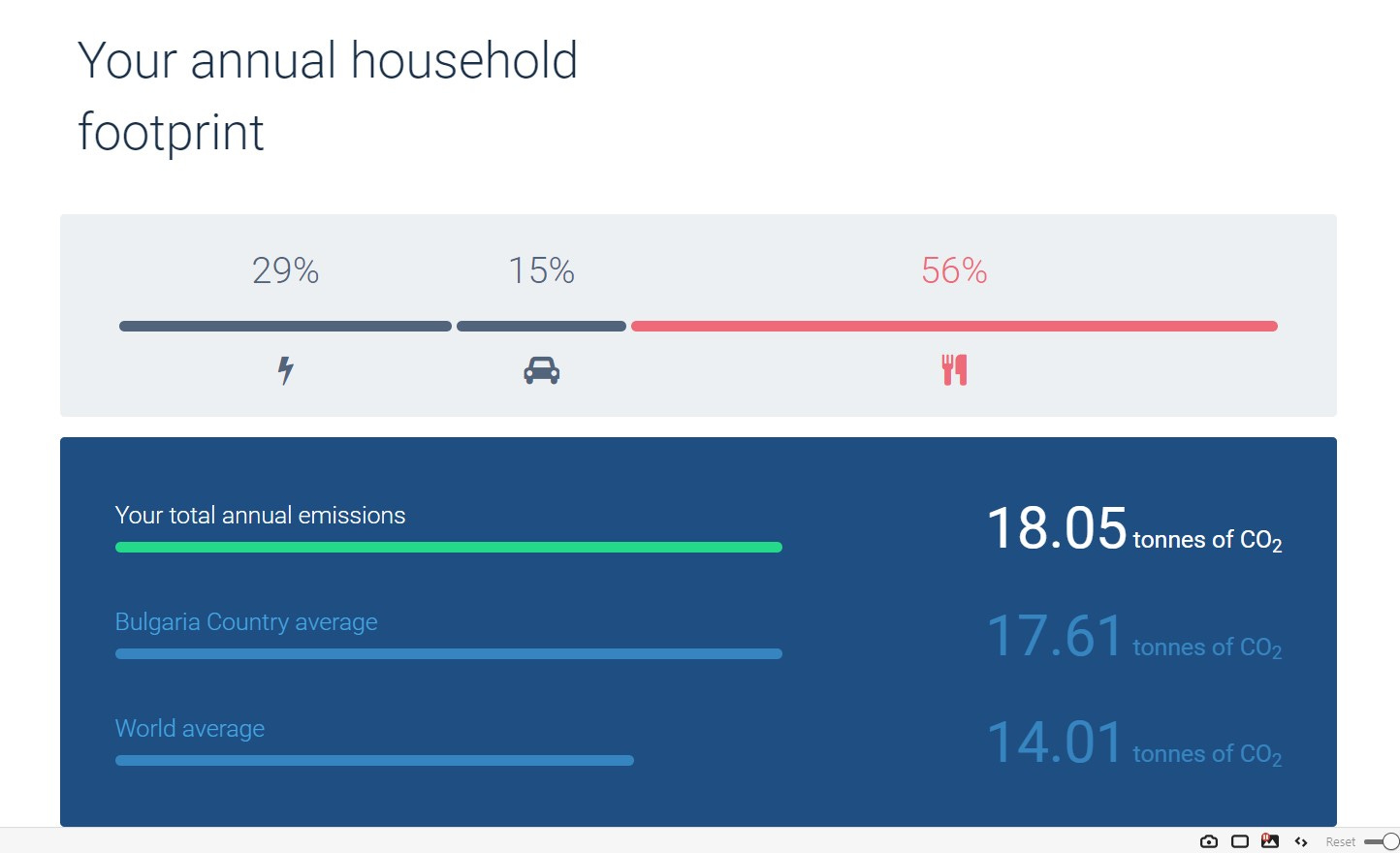
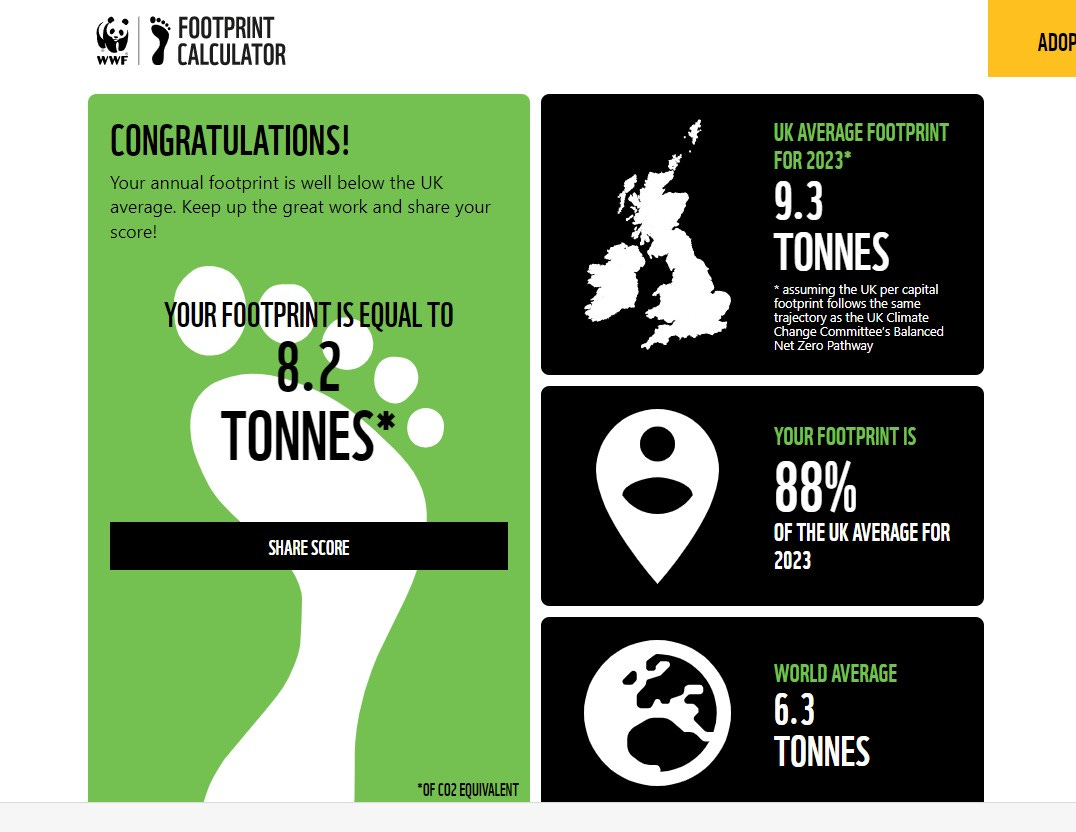
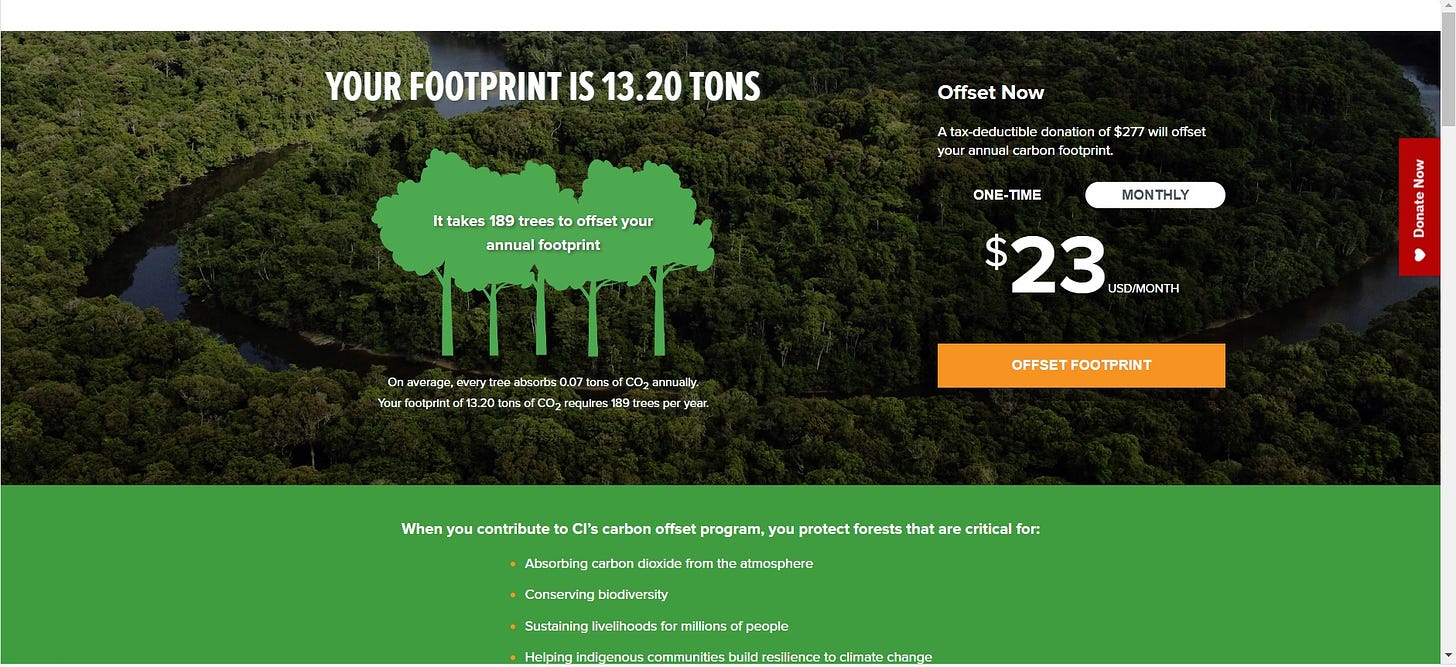
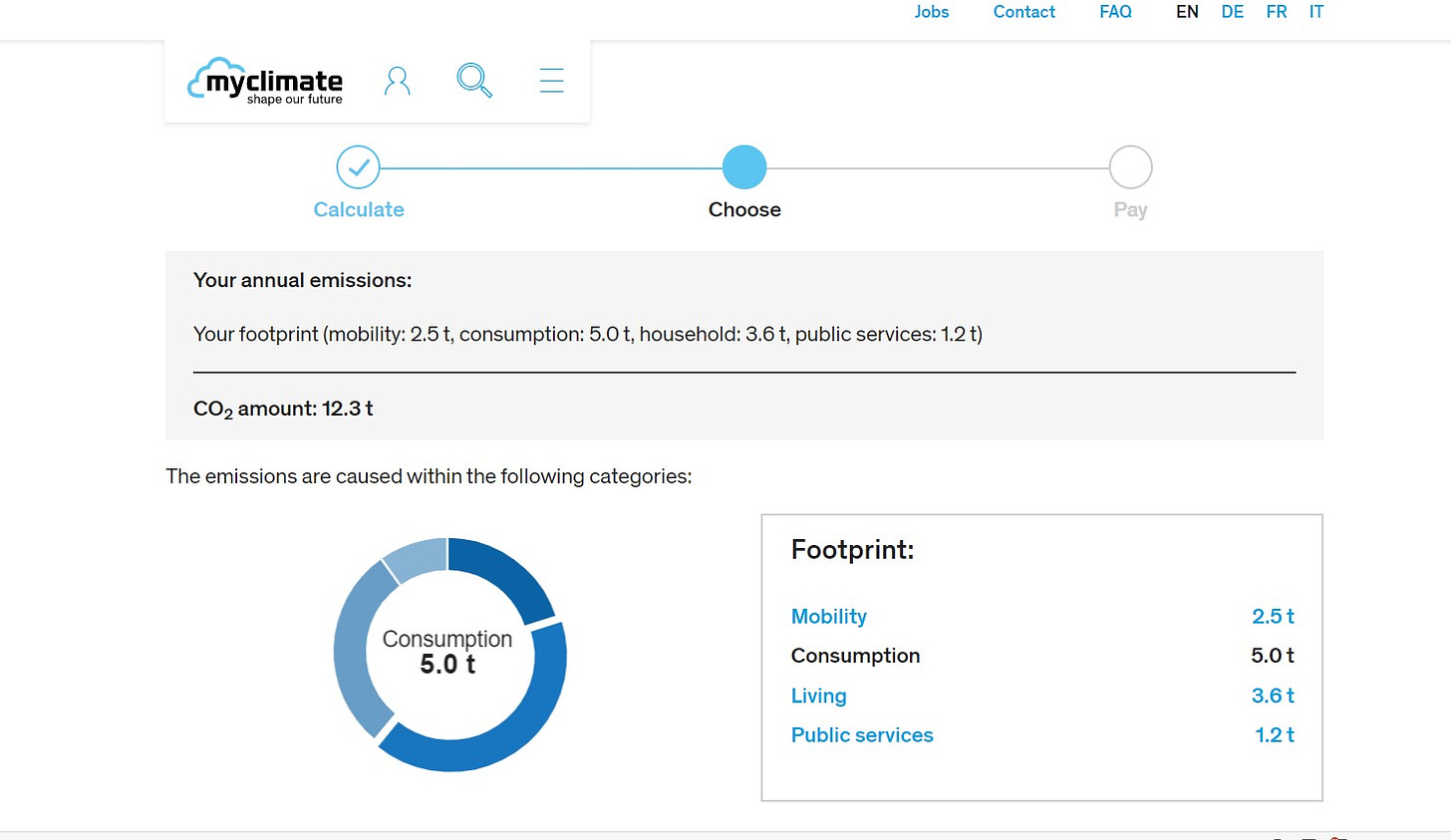
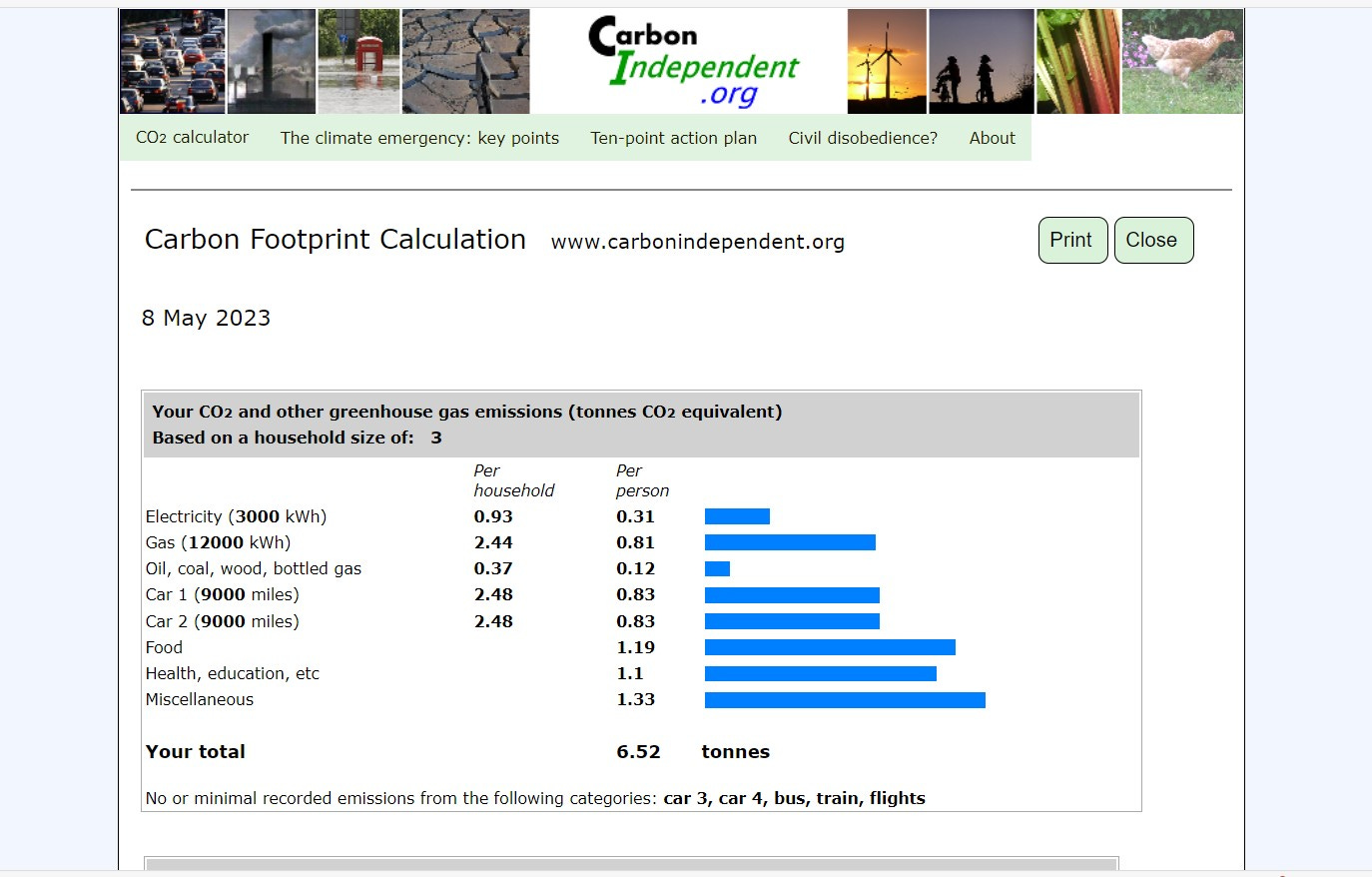
Ah, but degrowth is for thee, Irina, not for the elites among us like US Climate "Czar" Jon Kerry:
"John Kerry needs to fly private to negotiate climate deals that help China pollute and prosper while tanking the American economy. "It's the only choice for somebody like me who is traveling the world..I have to fly to meet with people and get things done."
Hypocrites, the entire lot of them!
I tried doing mine! I got 83 tons of CO2. Apparently thats a lot